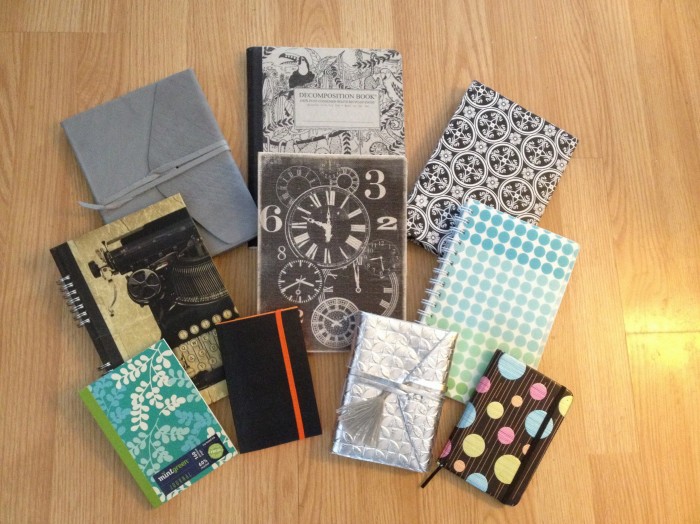Quiet down peoples, I have a confession to make. I have far too many journals.
That’s right, you heard me. Taking a count of my collection, I’ll never need to buy another, but I can’t help myself. Friends even enable my habit by gifting them. (Not that they’re aware of my compulsion or I’d never get another. Shhhhh!)
Can you blame me? Look at them all! Some wrapped in leather, others with nifty designs, some small enough to tuck in my purse, all with blank pages screaming out to be inked, open to take in my crazy thoughts without judgement.

Perfect! *cue high pitched girly squeal*
When I was a kid we received journals in our grab bags at a friends birthday party. Mine was small with red fabric and some exotic design, and I filled it with grade school crashes and drama. Since then, I’ve filled boxes with used journals (including that first red one) spanning my high school and adult years in what I now realize was my first true writing experiment.
In my day job we encourage clients to journal, even hand them out, and I’m surprised how often they state “I don’t know how to journal”. Because it was regular practice in my formative years, it never occurred to me people look at journalling as something they could possibly do wrong.
In case you’re among those who have always wanted to journal but never had the opportunity or someone to show the way, I’ve made some simple notes on how to make your journal work for you.
1. How to Start – This is a personal choice and should be whatever makes you comfortable. Dive right into what you need to say in the moment, recount your day, or use an intro. “Dear Diary”, “Hey it’s me again”, name your journal to make it feel you’re speaking to a friend, whatever gets the words flowing.
2. Paper Or Online – I’ve always journalled on paper, for me the physical act of writing with a pen is more cathartic. However, if you’re looking for an online journal here is the first one that came up in a Google search – penzu.com. Since I’ve never used it, I don’t know how user friendly it is or how safe your personal information is, but I encourage you to explore and let me know if it works for you.
3. Be 100% Honest – In life we don’t say everything that comes to mind, even the most outspoken of us. We hold back opinions and aspects of ourselves in fear of others reactions or because we’ve been taught manners. A journal is the place to write about how you thought the mini-skirt your sister-in-law wore to your uncle’s funeral was inappropriate or how you weren’t sad for your uncle’s death because he wasn’t a good man anyway. Whatever you write should be uninhibited by the presumed reactions of others. Since no one else will read it, you have no reason to fret consequence.
4. Frequency Equals Freedom – Find time to journal as often as possible. On the bus, on your lunch break, before bed, in the bath, once the kids are in bed, anytime you feel you need to. Even if you find some quiet time only once a week, by the end of the year you’ll have 52 entries of inner thoughts you’re no longer carrying around. Unburden yourself and get it out your skull in order to focus forward onto the next thing life has to throw at you. The more often, the better.
5. No Room For Teacher’s Pet – Grammar and punctuation should never be a factor. If it is, you’re thinking too hard. Give yourself permission to drop your grammar Nazi tendencies and just write. No teacher, editor, or fastidious friend is around with a red pen ready to pounce. Keep the words flowing and your mind on the goal of putting words to paper.
6. Keep It Private – Kids rules apply. If you live with others, don’t leave it around. Yes, as an adult no should invade your privacy, and you shouldn’t need to keep it under lock and key, but if you have issues with others reading your inner most thoughts, then keep it somewhere safe. People tend to think more about erasing their browser history. Never be ashamed of the thoughts you have, but protect them regardless.
7. Personal Growth – Read back. This is better done when you’ve finished a journal or when you’ve come out onto the other side of a bad situation and have some distance from it. Reading back and reflecting on how your thoughts were in the beginning as opposed to the end can be a helpful, reflective exercise. Did your perspective remain the same or did it change? Did you laugh at some shenanigans which seemed important at the time? Did it jog your memory about something that happened you would have otherwise forgot about and were happy you recorded it? I read back and realized myself and the Hubster have been celebrating our anniversary on the wrong day for over 10 years. Too late to change now, so we didn’t, but even that little tidbit would have lost if I hadn’t gushed about our first date.
Remember, the whole point of journalling is self-care. Think of it as a best friend and cost effective therapist at your finger tips. Utilize it to vent, de-stress, debrief from a hard day, and to record any thing you deem important. Not every entry has to be negative, documenting a great day with your family is just as important. As long as what you write is true to your feelings, you’ve accomplished everything that’s important about journalling.
Do you journal? On paper or Online? I’m interested to know how others do it and what journalling does for them. Make a comment or send me a personal email, I’d love to hear from you.